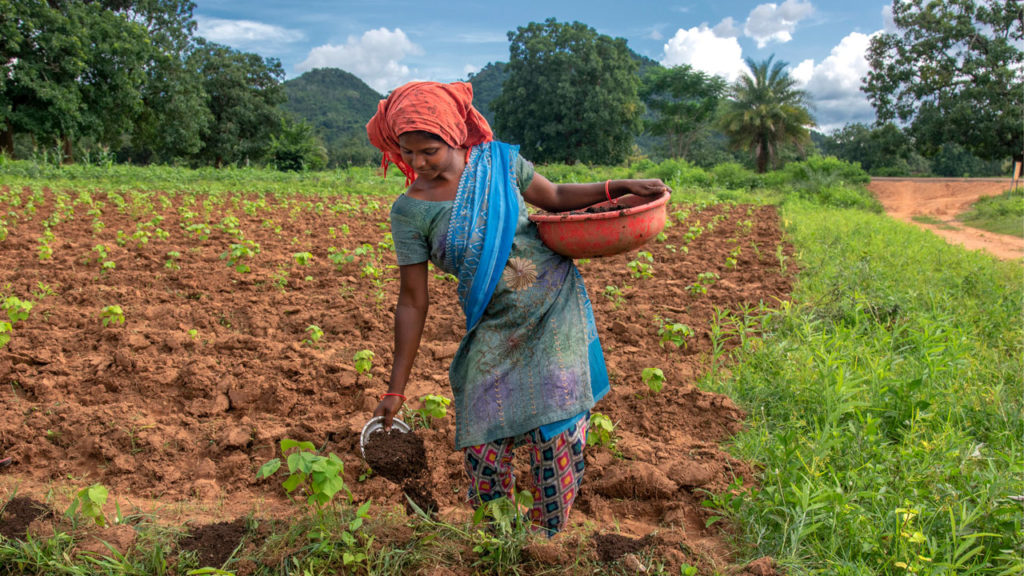A new Fairtrade pilot will pay an extra sum of money, on top of the market price, to Fairtrade organic cotton farmers in India. Find out more in our Q&A with Subindu Garkhel, Cotton and Textiles Lead at Fairtrade Foundation
What is the Fairtrade Organic Cotton Differential Pilot?
Subindu Garkhel: Fairtrade is piloting paying an extra sum of money on top of the market price for Fairtrade organic cotton in India. This pilot will see an extra 0.03€ per kg of seed cotton go into the farmer’s pocket. Some might refer to it as ‘rewarding eco-system services’, but we are calling it the organic differential that the farmer gets in addition to the market price and Fairtrade Premium.
We heard that organic cotton is already expensive. Why are you introducing it now?
We had a stakeholder meeting with Fairtrade cotton farmers and their representatives in December 2019 where we agreed on the new organic differential amount. Unfortunately, we had to hold back the pilot due to the outbreak of the pandemic in 2020. Then at the start of 2021, we saw the price for organic cotton go through the roof. However, in almost all cases the farmers did not receive the benefit of this higher price. With this pilot, we hope to see an increase in farmer incomes.
What is organic and what do you think Fairtrade’s role is?
Organic is an agricultural system that works in harmony with nature. Organic certification is usually regulated at national level prohibiting the use of synthetic pesticides, fertilizers, genetically modified plants or products.
About 60-75% of Fairtrade cotton is organic certified. Fairtrade itself is not an organic certification but encourages organic farming in the following ways:
- Fairtrade has a higher Fairtrade Minimum Price for organic, usually about 20% higher than the Fairtrade Minimum Price.
- Fairtrade farmer organisations often use up to 60% of their Fairtrade Premium on purchasing inputs for organic farming.
- Fairtrade acts as a support structure for farmers in the first three years of organic transition.
- Fairtrade has a non-GMO seed production project running for over five years.
Why is transitioning to organic cotton difficult for farmers?
It takes around three years for farmers to get organic certification. During this time, farmers use organic practices to rebalance the soil and ecosystem. In the first few years, farmers get low yields of cotton, which isn’t yet recognised as organic. It’s a tough period that puts off many farmers from trying organic farming.
How does Fairtrade support farmers to switch to organic?
Fairtrade supports farmers to overcome these challenges. The Fairtrade Minimum Price (where applicable) and Fairtrade Premium gives farmers the confidence and support to transition to organic farming. We have many examples of farmers using Fairtrade as a support mechanism and successfully transitioning to organic over the last 25 years, not just in cotton but in other commodities too.
Find out more about the Fairtrade Premium
Do you think this pilot will be a success?
We will have to wait and see whether the pilot is a success, but we’re very confident that this will be the case.
For many years, there has been a high demand for organic cotton. Brands who want to use organic cotton in their products have complained that not enough farmers want to make the switch to organic. At the same time, these brands aren’t willing to pay a fair price to farmers to cover the cost of the extra effort involved in producing organic cotton. The business case for farmers isn’t strong enough. With our new pilot, it’s time to see if brands will put their money where their mouth is. Fairtrade and organic are complementary to each other, making the best business case for the farmer as well as brands.
There is a long way to go before cotton farmers can start earning a living income, however through our pilot we are hoping that their incomes will increase. It is only a small sum that might not mean much for the consumer or the brand, but it will make a big difference to the lives of smallholder cotton farmers and their families.
What do the farmers and suppliers think?
We reached out to the farmers and suppliers to hear their thoughts on Fairtrade’s new pilot.
Vice President of Armstrong Spinning Mills, A. Narayanasamy says, ‘We at Armstrong Spinning Mills welcome the Pilot project and Organic Premium to be given to farmers in addition to Fairtrade Premium.’
Arun C Ambatipudi, Founder of Chetna Organic in India says, ‘The Fairtrade Cotton Organic Differential Pilot initiated by Fairtrade in late 2019 with concurrence by the Fairtrade cotton producers/projects in India, and in my opinion was a good step, considering various factors in the sector at that point of time.
‘Considering the current scenario with global Organic and Fairtrade cotton and the insecurities/volatilities, I believe this model has a great potential in the sustainability cotton space to build from there and evolve into something (based on learnings and realities) that could positively impact Organic and Fairtrade Cotton.’
Find out more
If you would like to find out more about the new pilot and Fairtrade’s work with cotton farmers, please email: cotton@fairtrade.org.uk.
